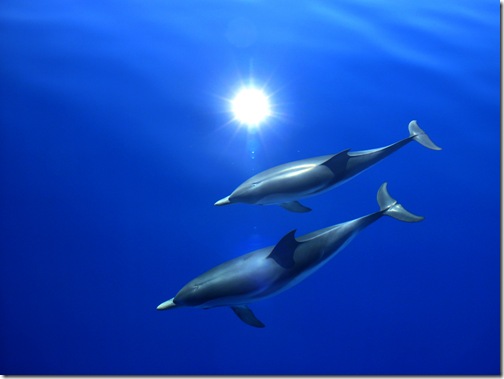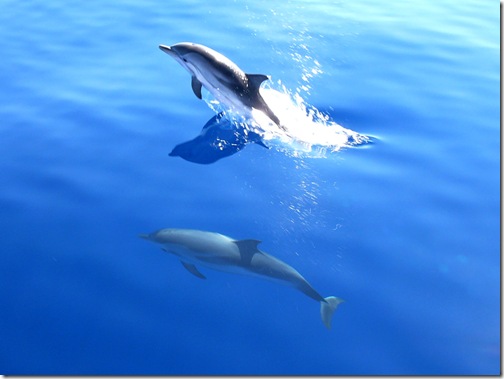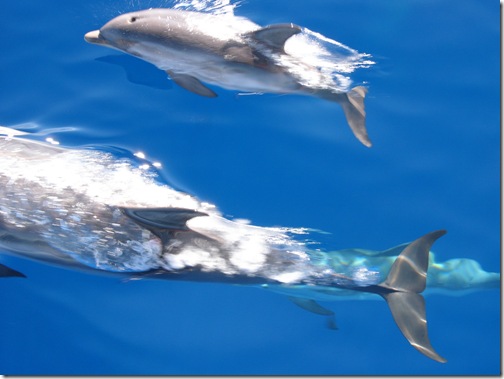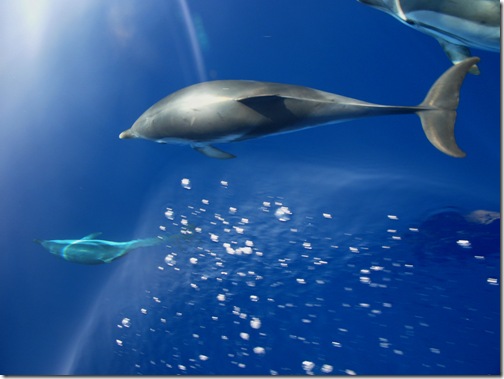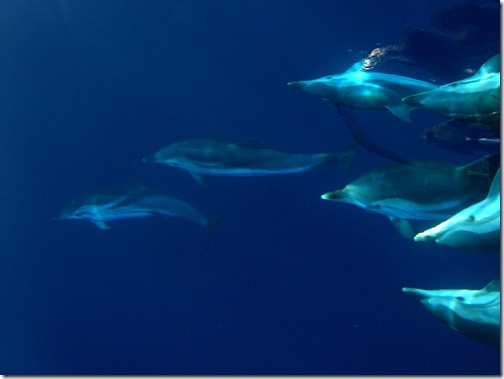All photos on this page: Leica Digilux 2 100 ISO
During the last 20 years of sailing I have been very fortunate to have seen a lot of dolphins, but no matter how often I see them it’s always a treat. I always go to the bows and say hello. I’ve often wondered what they make of us in our bright waterproof clothing. They are obviously intelligent, you only have to watch them for a while to see that. It reminds me of that fabulous Douglas Adams quote:
It is an important and popular fact that things are not always what they seem. For instance, on the planet Earth, man had always assumed that he was more intelligent than dolphins because he had achieved so much — the wheel, New York, wars and so on — whilst all the dolphins had ever done was muck about in the water having a good time. But conversely, the dolphins had always believed that they were far more intelligent than man — for precisely the same reasons.
The famous and revered French sailor Bernard Moitessier wrote about how some dolphins helped him one night when he was on course to run into an island. His book The Long Way is a fantastic read. He describes how a group of dolphins swam past and always to the right. The wind had shifted and he was off course. When he changed course one of the dolphins leapt high into the air almost as if he was saying, ‘look, we made that human understand, how cool is that?’ Even though Moitessier wrote in French the English translated version is still excellent. He was a true sailor and he not only understood but he could pass on his feelings in wonderfully descriptive stories. If you have never read Moitessier I cannot recommend him highly enough.
Dolphins have even been to my aid though sadly I cannot tell the tale as well as Bernard but I’ll do my best. We had left Sao Miguel in the Azores on route to Gibraltar on Doolittle our Dana 24. We’d spent a very happy 6 weeks in the Azores but we were both conscious of a feeling of harbour rot. Life was cheap and easy in the Azores and although we had sailed 2500 miles to get this far, we still had 1000 miles to go and were aware that we had become soft. We’d lost the rhythm of the sea.
To complicate matters, Hurricane Harvey was approaching the Azores so we wanted to get away before it arrived. There was a good chance it wouldn’t make it that far into the Atlantic but we figured putting as much distance as we could between us and it was a good idea. The window for leaving wasn’t great but it wasn’t bad either. One has to cast off at some time. Sometimes it’s hard to know whether you are being a wuss or whether it’s really not a good idea to go. The longer you spend in port, the harder the decision to leave becomes.
We decided to go anyway and had a cracking sail for a few hours under the lee of the land. As we approached the end of the island we could see white water ahead. I assumed it was the current, often strong around islands. As we sailed ever closer to the whiteness it became obvious that in fact it was the sea that was white. It was white because a gale was blowing.
As soon as we came out of the protection of the land we found ourselves in ten foot waves and 30 knots of wind. We reefed the sails and carried on but it seemed a bit much to be thrown into a gale so soon out of port. It’s much better to have a few days of gentle sailing before bad weather strikes. While I was dealing with the sails the clouds overhead were growing at a very fast rate. It was a cloudless day one moment, the next there was a wide cloud that went from one horizon to the other. It did not bode well.
When you spend a lot of time at sea, you begin to be able to read the clouds. If not consciously, then at least subconsciously and they can tell you a lot. What we were seeing was new to me. It was quite possible that it was just a local phenomena or it might just look bad and mean nothing. The question of whether to carry on was broached.
If we were going to turn around, now was the time to do it. Neither of us wanted to be spending our first night at sea in those conditions, not after 6 soft weeks ashore yet we knew what to expect. The boat could easily take the weather. So could we. It wouldn’t be the first time, but we still had ten days and nights ahead of us. As we were wondering what to do a small group of about five dolphins appeared.
Usually dolphins ride the bow wave when they come to visit, they drop away and you can see them dive deep only to come up behind the boat once more. They behave in many different ways but these dolphins were swimming across the bows, back and forth. Well, that decided it for us. It was a clear sign. If we had any doubt it was all gone now. We turned the boat around and pointed in the direction of the port.
The dolphins turned with us and swam with us a little way now acting normally. Then they disappeared as quickly as they had arrived. I’ve often thought about this. I am in no doubt that the dolphins were trying to tell us something. If crossing the bows was normal behaviour, why hadn’t I seen it before? Besides, why didn’t they do it after we had turned around? I wonder what would have happened if we had carried on. I guess that’s something that I will never know.
It’s entirely possible that they were winding us up however. ‘ Look Dave, a small yacht that’s been in port a long time, bet they’re shitting bricks, lets go and have a laugh. You swim from left to right and I’ll swim from right to left’. I wouldn’t put it past them. We met a guy in the Azores who had often swum with dolphins and he assured me it was quite safe to get in the water with them. He said that sometimes they come straight at you at 20 knots and then at the very last moment, deftly swerve around you making high pitched squeaks that can only be interpreted as laughter.
Dolphins are awesome.
